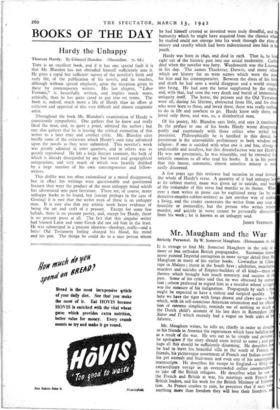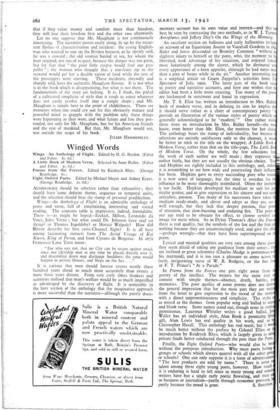Mr. Maugham and the War
Strictly Personal. By W. Somerset Maugham. (Heinemann. 8s. 6d IT is strange to find Mr. Somerset Maugham in the role of more or less orthodox British propagandist. Suetonius him never painted Imperial corruption in more savage detail than h Maugham in many of his earlier books. Cowardice in China rape in Malaya ; incest in the South Seas ; adulteries, treacheri murders and suicides of Empire-builders of all kinds—these themes which brought him much notoriety and success in th past. Some of his critics said that he was obsessed by corm tion ' • others preferred to regard him as a moralist whose savage was the measure of his indignation. Propaganda by such a m• might be expected to have a violent and surgical quality. Y• here we have the tiger with fangs drawn and claws cut—a which, with its self-conscious American orientation and its affect• tion of extreme simplicity, reminds me of nothing so much the Dutch child's account of his last days in Rotterdam (M Sister and I) which recently had a vogue on both sides of
Atlantic. •
Mr. Maugham writes, he tells us, chiefly in order to descn to his friends in America the experiences which have befallen as a result of the war. He sets out to be simple and personal he apologises if the story should seem trivial to some ; and haps all this should be sufficiently disarming. He describes he had to leave his beautiful villa in the south of France, friends, his picturesque assortment of French and Italian servo his pet animals and fruit-trees and even one of his uncomplet• manuscripts. He describes his escape to England—a filthy extraordinary voyage in an overcrowded collier commandee to take off the British refugees. He describes what he saw the French and British at war, his meetings with French British leaders, and his work for the British Ministry of Info tion. As France crashes to ruin, he perceives that if men Val anything more than freedom they will lose their freedom.
that if they value money and comfort more than freedom, they will lose their freedom first and the other two afterwards. Let no one suppose that Mr. Maugham is not continuously interesting. The narrative moves easily along, lit up by the recur- rent flashes of characterisation and incident : the young English- man who wanted to stay on the Riviera because, as he openly said, he was a coward ; the old woman buried at sea, for whom the boat stopped, not out of respect, because the danger was too great, but for fear that " the poor little corpse would foul our pro- peller " ; the woman who thought that a too-franc tip to the steward would get her a double ration of food while the rest of the passengers were starving. These incidents, shrewdly and sharply told, have the authentic Maugham flavour. It is not what is in the book which is disappointing, but what is not there. The fundamentals of the story are lacking. It is, I think, the pitfall of a cultivated simplicity of style that it tends to reject whatever does not easily resolve .itself into a simple shape ; and Mr. Maugham is simple here to the point of childishness. There are moments when one could cry out for this obviously mature and • powerful mind to grapple with the problem why these things were happening as they were, and what future and fate they por- tended, not only for Mr. Maugham, but for his American friends and the rest of mankind. But that, Mr. Maugham would say, was outside the scope of his book.
JULIAN HAMMERSLEY.



























 Previous page
Previous page